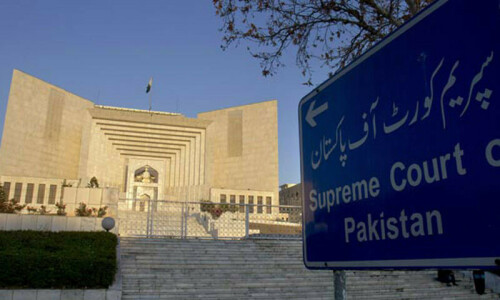ISLAMABAD, Jan 28: Dr Nazir Hussain, who teaches Strategic Studies at the Quaid-i-Azam University, sees the 23-day Gaza war as Hamas victory and defeat of the Israel.
In his assessment at a panel discussion held Wednesday at the Institute of Policy Studies (IPS) on the human cost of Israel’s aggression, Dr Hussain said Hamas made a technical resistance against Israel “which could not jolt the emotions of Palestinian people.”
As soon as the ceasefire was announced, they were seen tending the wounded and sick, and busy in arranging food for the affected people. Mr Hussain also feared another round of aggression by the Israelis in days ahead.
“Israel attempt to plant ‘Greater Israel of Greater Middle East’ on Gaza territory has been bludgeoned by Hamas,” said Senator Professor Khursheed Ahmad.
He said Israel had always received encouragement from the US and European Union countries in its aggressive desire, but following this Hamas victory, Israel’s wish has been stymied forever.
However, Foundation for Research on International Environment, National Development and Security (Friends) chairman and former army chief Gen (retired) Mirza Aslam Beg put a damper on these happy feelings with his declaration that he saw the emergence of two Palestinian states, not one.
“One would belong to Hamas faction and the second one to Fatah, because of internal disunity within their ranks as well as the silence of Arab countries.”
Gen Beg saw the Israeli aggression against Palestinians in Gaza and related events in the Middle East in relation to the machinations of Western powers, especially with regard to the timing of the conflict which had its relevance with transition in the US and forthcoming elections in Israel and Palestine. He said: “Israel has committed war crimes and crimes against humanity and Muslim rulers of the region played a shameful role in the recent crisis.”
The general disunity among Muslim leaders, notwithstanding, Gen Beg saw change as well as rise of Muslim nations, especially among the Mujahideens who led a world struggle for freedom on behalf weak and oppressed people of Chechnya, Kashmir and Palestine.
“These people were bound to come up on top,” he said.Former ambassador Tariq Fatimi, one of the three discussants at the discussion session, did not appear to be very hopeful that a Palestinian state would come about. In his views, 78 per cent of Palestine territory was illegally occupied by the Israelis. “Legality of very existence of the state of Israel is dubious.”
He wondered whether the United Nations was being deliberately kept away from any developments.
In the Middle East, United States itself had taken the role of “prosecutor, adjudicator and jury” in the conflict. He also wondered if the United Nations was deliberately kept away from any developments in the Middle East.
Speaking in this context, he did not see a change of policy towards Pakistan during Barack Obama’s presidency and added that he would take the same hard line.
An observation came up from the audience that Muslim countries were right in waging a campaign to bring the Israelis to war crime tribunals for committing atrocities against the Palestinians because the Israelis were preparing for committing aggression on the Hamas since the last one year and half.
Former ambassador Samiullah Qureshi desired that the Muslim countries should walk out of the UN, and act on the same idea mooted at one time by the late Indonesian President Soekarno.
Another suggestion said Muslim countries should vow to withdraw their total money from Western banks and consolidate their wealth in creating a new currency to be designated as the Dinar. The participant added that the same idea was put across by Malaysia's former premier Mahathir Mohamad and it was now time to implement this idea.
Earlier speaking on the first day of the seminar speakers said that more lives were lost due to threats from non-traditional agents than inter-state wars.
Dr Pervez Iqbal Cheema, Director of Islamabad Policy Research Institute, gave the warning in his introductory remarks.
Dr Cheema said poor education, less food, decreasing gas; electricity and water resources are potential threat to national security. The absence of these facilities undermines the national security, which becomes more vulnerable than from post–Mumbai pheromone giving rise to dangers of war and surgical strikes.
Hanns Seidel Foundation Resident Representative Richard Asbeck stressed on understanding the root causes of terrorism and asked the participants to address the economic, societal and environmental problems.
Quaid-i-Azam University Defence and Strategic Studies Chairman Dr Syed Riffat listed transmigration of people as a potent threat. Sometimes stateless people and refugees tend to create disorder in the society as, for example, in case of the influx of Afghan refugees who not only broke the social fabric and destroyed its peace with gunrunning and Kalashnikov culture, suicides and mayhem.
Independent economist Dr Shahid Hasan Siddiqui said the monetary situation could improve if parliamentarians led the way and brought their foreign exchange account back into the country, and did not accept the next tranche from IMF. Dr Zafar Moeen Nasir agreed with him in several respects.
The energy crisis and shortage of water were equally great threats to Pakistan, argued Dr A.H. Nayyer and Ms Mehnaz Ajmal Paracha in their presentation. Dr Nayyar said Pakistan had done very little to invest to develop alternative energy resources. Ms Mehnaz Paracha said water scarcity might lead to conflict situation. She also pleaded greater attention to now-melting Siachen glaciers.














































Dear visitor, the comments section is undergoing an overhaul and will return soon.